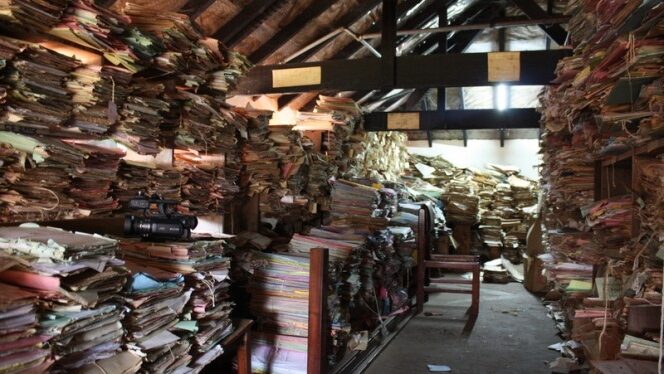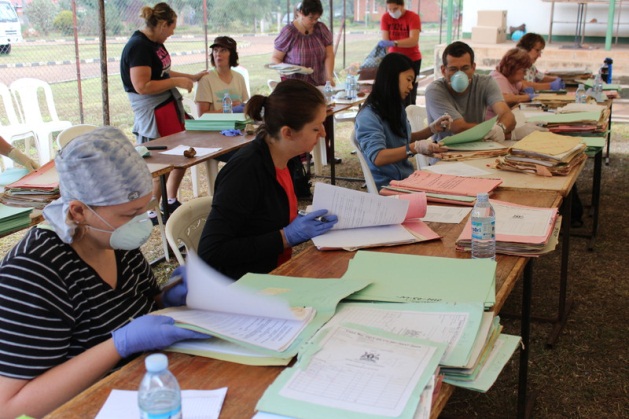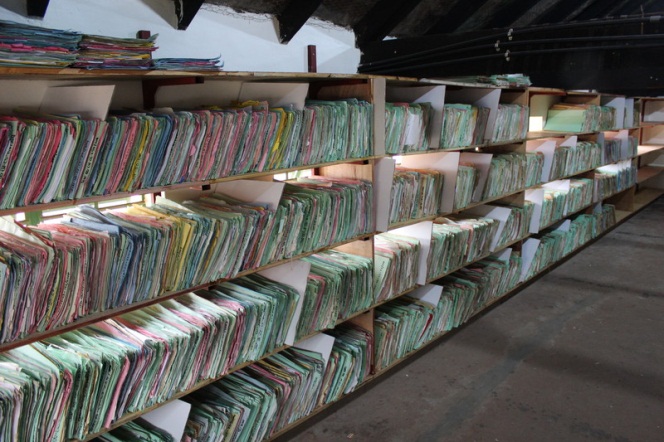IJM Uganda: Justice Starts with…Paperwork?
Land Theft
Oct. 24, 2013
KAMPALA, UGANDA – Faces obscured with dust masks streamed back and forth between a Ugandan courthouse and the large white tent dominating its yard. Volunteers hauled armfuls of dust-covered files to the tent's long tables, where another group carefully labeled each with a neat legal code.
Together with local staff from IJM Uganda, these volunteers organized more than 100,000 important records at two local courthouses this way. Though tired and dirty—with white latex gloves turned dirt brown—they knew their tedious work was crucial.
Thanks to their hard work, court cases can soon run more smoothly—and thousands of people in this area will have access to justice that was impossible before.

Justice Begins with Piles of Paper
Mukono District, where the team organized thousands of court records, has a high rate of property grabbing—that is, powerful neighbors or relatives stealing homes and land from vulnerable widows. These women should be able to rely on local police and courts for help, but few actually trust the over-burdened system to protect them.
Improving court records in Mukono District—where IJM has worked since 2008—will be critical for anyone seeking justice, but especially for impoverished widows and orphans who have no other support.
If a widow does report a case of property grabbing, her trial could take months to get started. Finding simple land registration documents—evidence that can make or break a case—may mean literally digging through piles of loose paper. One filing mistake could mean a file is lost forever.
Basic disorganization like this means disaster for a poor widow. "If evidence goes missing due to a poor filing system, this leads to loss of legal claims and therefore loss of land and livelihood for the vulnerable widows and orphans who we work to defend,” explains Juliet Musoke, Director of Structural Transformation for IJM in Uganda.

But in 2011, IJM began extensive research to determine how to help local courts become more efficient. Studies revealed a serious lack of basic record-keeping systems and important technology to track cases, among other issues. Courts in Mukono and nearby Jinja (where some IJM cases are heard) were happy for the offer of help setting up systems for filing land registration records and other important legal documents.

Meeting the Women Behind the Files
In July 2013, nearly two dozen American volunteers traveled to Uganda to help organize the mountains of critical records that had accumulated in the Mukono courts. The volunteers came from churches partnering with IJM to seek justice in their communities and around the world.
Before they began working, the volunteers met Ramona* and Constance—Ugandan widows IJM has helped in the past few years. Both women were victims of property grabbing, but, thanks to their perseverance and IJM's assistance, they are thriving today.
Ramona is a young mother of six children. Her relatives have tried to bully her out of the home she built herself, brick-by-brick, during her husband's last days battling an illness. Her legal case is still ongoing, but IJM has made sure that Ramona is safe and secure on the land that is hers in the meantime.
Like Ramona, Constance became the target of greedy relatives who wanted to steal her home after her husband's death. As a result of IJM's advocacy, she is now safe on her land and thriving as a respected businesswoman in her community.
Meeting these two women made a world of difference to Kendall Phillips, a college junior and volunteer helping with the filing project: "It was hard for me to understand why [the filing] had to be done until we met the clients. It made it so real. This is who we are doing this for."
After that visit, one volunteer taped a green paper on the tent where all of the files and boxes were set up. In black marker it read: Remember Ramona and Constance. You could be holding their files.
Getting Organized
Energized by these visits, the first team of IJM staff and volunteers from Crossroads Church in Minnesota and Knox Presbyterian Church in Michigan began organizing neglected files in a court's attic space. They carried heaps of files dating back to the 1950s out into the tent—sorting, labelling, bundling and organizing everything carefully.
Midway through the week, the team discovered another room packed with jumbled files. Undeterred by the ever-growing project, they pressed on for six days—working more than 12 hours a day—to organize the 60,000 loose files at the Jinja Court.
The next week, volunteers from Knox Presbyterian Church were joined by a team from Ecclesia Church in Texas and students from Uganda Christian University. This team sorted through similar piles in dusty rooms occupied by bats and rats. They worked tirelessly to organize nearly 40,000 files.
Court officials and those attending hearings were all curious about the groups working hard outside, busily sorting through old files and placing them neatly in new boxes. Juliet says even the IJM Kampala staff marveled at these groups doing monotonous work so faithfully.
"What the volunteers did will not only impact widows and orphans, but all vulnerable people in Uganda who rely on a functioning court system to restore that which has been taken from them," she says. "They worked tirelessly and demonstrated what commitment is all about."
Mobilizing Lasting Change
These church volunteers provided an important service that likely would not have been possible for either under-resourced courthouse.
"We needed to mobilize a large number of volunteers at once," said Chong-Ae Shah, IJM's Executive Vice President of Global Brand Marketing and Mobilization. "We had to focus a high level of effort in a short time to show the courts that it is possible to create a working system."
After the two-week, massive undertaking, more than 100,000 files were sorted and filed in a brand-new system. These papers could lead to justice for countless women and children in these districts.
IJM will continue working with the Mukono and Jinja courts to train court staff on maintaining the new, efficient record-keeping system. IJM also has plans to help update the court's technology and strengthen these reforms so that this part of the court system is transformed for good.
*A pseudonym